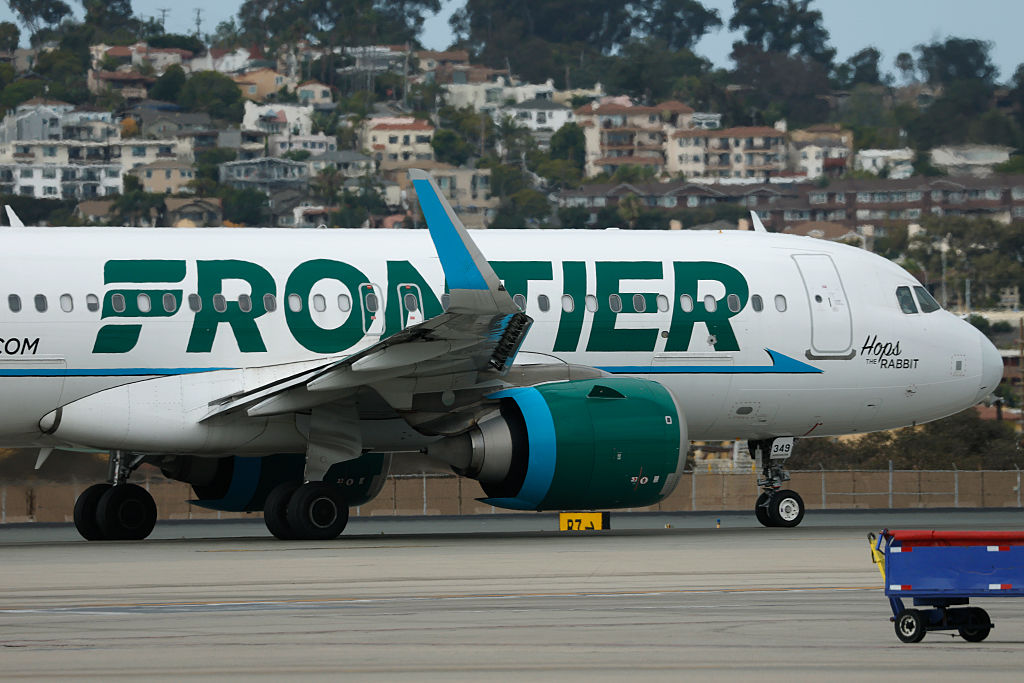Frontier’s GoWild! Annual Flight Pass: Is the $349 All‑You‑Can‑Fly Deal Worth It?
Frontier’s GoWild! Pass offers unlimited flights for $349, but blackout dates, standby rules and fees apply. See who benefits and if it’s worth it.


Profit and prosper with the best of Kiplinger's advice on investing, taxes, retirement, personal finance and much more. Delivered daily. Enter your email in the box and click Sign Me Up.
You are now subscribed
Your newsletter sign-up was successful
Want to add more newsletters?

Delivered daily
Kiplinger Today
Profit and prosper with the best of Kiplinger's advice on investing, taxes, retirement, personal finance and much more delivered daily. Smart money moves start here.

Sent five days a week
Kiplinger A Step Ahead
Get practical help to make better financial decisions in your everyday life, from spending to savings on top deals.

Delivered daily
Kiplinger Closing Bell
Get today's biggest financial and investing headlines delivered to your inbox every day the U.S. stock market is open.

Sent twice a week
Kiplinger Adviser Intel
Financial pros across the country share best practices and fresh tactics to preserve and grow your wealth.

Delivered weekly
Kiplinger Tax Tips
Trim your federal and state tax bills with practical tax-planning and tax-cutting strategies.

Sent twice a week
Kiplinger Retirement Tips
Your twice-a-week guide to planning and enjoying a financially secure and richly rewarding retirement

Sent bimonthly.
Kiplinger Adviser Angle
Insights for advisers, wealth managers and other financial professionals.

Sent twice a week
Kiplinger Investing Weekly
Your twice-a-week roundup of promising stocks, funds, companies and industries you should consider, ones you should avoid, and why.

Sent weekly for six weeks
Kiplinger Invest for Retirement
Your step-by-step six-part series on how to invest for retirement, from devising a successful strategy to exactly which investments to choose.
If you’ve ever daydreamed about booking spontaneous getaways without worrying about airfare, Frontier Airlines’ GoWild! Pass might seem like the golden ticket.
Right now, the pass is on sale for $349 a year (plus taxes and fees), the all-you-can-fly deal promises unlimited flights across the U.S., Mexico, the Caribbean and more.
But is it a true travel hack or just another too-good-to-be-true gimmick? Here’s what you need to know before signing up.
From just $107.88 $24.99 for Kiplinger Personal Finance
Become a smarter, better informed investor. Subscribe from just $107.88 $24.99, plus get up to 4 Special Issues

Sign up for Kiplinger’s Free Newsletters
Profit and prosper with the best of expert advice on investing, taxes, retirement, personal finance and more - straight to your e-mail.
Profit and prosper with the best of expert advice - straight to your e-mail.
What is the GoWild! Pass?
The GoWild! Pass is Frontier Airlines’ subscription-based travel program. For one flat annual fee, you get access to unlimited flights on Frontier’s network for 12 months. You’ll still pay government-mandated taxes and fees starting at $14.90 per segment, but your base fare is covered.
Right now, the GoWild! Pass is on sale for $349 for the 2026-2027 season. The normal price is $599.
There’s also a monthly version of the pass (usually around $149), but the annual version is the best bang for your buck if you plan to use it enough.
The fine print could ground your plans
While the GoWild! Pass sounds like a great deal upfront, as with most budget airline deals, there are a few key restrictions to be aware of. Flexibility is key with this pass, because Frontier doesn't guarantee you’ll get a seat. Here’s why:
- Booking window: Domestic flights can only be booked one day in advance. International flights require a 10-day minimum lead time.
- Standby travel: Your flight is not guaranteed until confirmed. Seats are also subject to availability.
- Blackout dates: Expect limited access around holidays and peak travel seasons. Dates like Thanksgiving week and Christmas are completely blocked out.
- Add-ons aren’t included: You’ll pay extra for checked bags, carry-ons, seat assignments and priority boarding so these fees can add up in addition to paying taxes on the flight when you book it.
- No-shows get penalized: If you don’t cancel ahead of time and miss a flight, you’ll be hit with a fee.
Itching to fly? One of Kiplinger’s top airline cards could help you earn rewards faster, score lounge access and save on flights, powered by Bankrate. Advertising disclosure.
Who should consider the GoWild! Pass (and who shouldn’t)
Frequent flyers with flexible schedules are the ones who stand to gain the most with the GoWild! Pass. While the flash sale price is a tempting deal, you’d probably get the most use out of it if you work remotely, have generous time off, or live near a Frontier hub (like Denver, Las Vegas, or Orlando). Also, if you’re retired or like to plan spontaneous trips at least three to four times per year, you could get the most value for your money.
For example, let’s say you fly from Atlanta to Miami for a weekend getaway. A last-minute one-way flight on a budget airline could cost $150 or more. With the GoWild! Pass, you could potentially book it the day before and only pay taxes and fees. Do that just three or four times per year, and you’ve already broken even on the $349.
On the other hand, this pass probably wouldn’t be a good idea for those who like to thoroughly plan out their trips or tend to travel during peak seasons, like during holidays or school breaks. If that’s the case, you’ll likely run into limitations that make the pass less appealing.
Tips to maximize the pass

If you’ve decided that the GoWild! Pass might work for you, here’s how to get the most value from it.
- Plan strategically around the booking windows: Make a habit of checking Frontier’s booking site regularly and keep in mind that early morning often yields the best availability.
- Avoid peak travel and holiday blackouts: Frontier’s blackout dates can include major periods (e.g., Thanksgiving, Christmas) and specific days from October to December. Reviewing those in advance and avoiding them entirely can save frustration. If your schedule is flexible enough, you can also plan to travel just before the holiday blackout date and spend an extra day or two at your destination to save.
- Pack light and skip checked luggage when you can: While the base fare won’t cost much aside from taxes and fees, baggage fees can add up. Try to travel with a personal item only to avoid paying for carry-ons or checked bags. Also, skip seat selection and let the system assign your seat. This is where the real savings stack up.
- Use it for short weekend or midweek trips: Booking spontaneous trips like a quick getaway from Nashville to Chicago can deliver maximum value.
- Be proactive about cancellations: Since Frontier may penalize no-shows, even if the penalty isn’t clearly quantified, it’s smarter to cancel your booking if you’re not flying. That keeps you in good standing and leaves the seat open for another traveler.
- Set fare alerts for your preferred routes: While GoWild! is about flexibility, having a backup plan (regular discount fares) for blocked-out dates or when GoWild! flights are sold out can help you avoid being stranded.
- Maximize miles and elite perks: You still earn Frontier miles when booking with GoWild! and elite status perks like free bags or upgrades can apply. Combine flexibility with any elite-level benefits to enhance your travel experience.
Frontier vs. other flight passes
Frontier isn’t the first airline to experiment with flight subscriptions. Alaska Airlines offers the Alaska Flight Pass which is a predictable, regionally-focused subscription. Users pay a flat monthly rate starting around $69, or $129 for more frequent travel.
Then, they receive a set number of round-trip credits per year within California, Arizona, Nevada and Utah. Benefits include no blackout dates, Main Cabin amenities, seat selection, earning points, free upgrades for elites and booking up to two weeks in advance.
United offers a high-end subscription for $599/year (for one subscriber up to eight companions) that grants complimentary upgrades to Economy Plus for domestic flights. A recent user noted saving hundreds of dollars on upgrade fees, making it worthwhile, especially for family travelers.
Is the GoWild! Pass worth it?
Frontier’s GoWild! Pass remains the lowest upfront cost for “unlimited” flying, but it's highly conditional: mostly last-minute, standby and with a variety of add-on costs. To many travelers, it may feel less like a golden ticket and more like a glorified standby pass.
That doesn’t mean it has no value. For the right person like retirees with a flexible schedule, or someone who enjoys hunting down spontaneous flight opportunities, it can deliver serious savings. The more you fly, the more worthwhile the $349 investment becomes.
But for families, business travelers, or anyone who prefers predictable plans, the restrictions will likely outweigh the benefits.
Related Content
Profit and prosper with the best of Kiplinger's advice on investing, taxes, retirement, personal finance and much more. Delivered daily. Enter your email in the box and click Sign Me Up.

Choncé is a personal finance freelance writer who enjoys writing about eCommerce, savings, banking, credit cards, and insurance. Having a background in journalism, she decided to dive deep into the world of content writing in 2013 after noticing many publications transitioning to digital formats. She has more than 10 years of experience writing content and graduated from Northern Illinois University.
-
 Quiz: Do You Know How to Avoid the "Medigap Trap?"
Quiz: Do You Know How to Avoid the "Medigap Trap?"Quiz Test your basic knowledge of the "Medigap Trap" in our quick quiz.
-
 5 Top Tax-Efficient Mutual Funds for Smarter Investing
5 Top Tax-Efficient Mutual Funds for Smarter InvestingMutual funds are many things, but "tax-friendly" usually isn't one of them. These are the exceptions.
-
 AI Sparks Existential Crisis for Software Stocks
AI Sparks Existential Crisis for Software StocksThe Kiplinger Letter Fears that SaaS subscription software could be rendered obsolete by artificial intelligence make investors jittery.
-
 One of the Most Powerful Wealth-Building Moves a Woman Can Make: A Midcareer Pivot
One of the Most Powerful Wealth-Building Moves a Woman Can Make: A Midcareer PivotIf it feels like you can't sustain what you're doing for the next 20 years, it's time for an honest look at what's draining you and what energizes you.
-
 I'm a Wealth Adviser Obsessed With Mahjong: Here Are 8 Ways It Can Teach Us How to Manage Our Money
I'm a Wealth Adviser Obsessed With Mahjong: Here Are 8 Ways It Can Teach Us How to Manage Our MoneyThis increasingly popular Chinese game can teach us not only how to help manage our money but also how important it is to connect with other people.
-
 Looking for a Financial Book That Won't Put Your Young Adult to Sleep? This One Makes 'Cents'
Looking for a Financial Book That Won't Put Your Young Adult to Sleep? This One Makes 'Cents'"Wealth Your Way" by Cosmo DeStefano offers a highly accessible guide for young adults and their parents on building wealth through simple, consistent habits.
-
 My Spouse and I Are Saving Money for a Down Payment on a House. Which Savings Account is the Best Way to Reach Our Goal?
My Spouse and I Are Saving Money for a Down Payment on a House. Which Savings Account is the Best Way to Reach Our Goal?Learn how timing matters when it comes to choosing the right account.
-
 We're 78 and Want to Use Our 2026 RMD to Treat Our Kids and Grandkids to a Vacation. How Should We Approach This?
We're 78 and Want to Use Our 2026 RMD to Treat Our Kids and Grandkids to a Vacation. How Should We Approach This?An extended family vacation can be a fun and bonding experience if planned well. Here are tips from travel experts.
-
 My First $1 Million: Retired From Real Estate, 75, San Francisco
My First $1 Million: Retired From Real Estate, 75, San FranciscoEver wonder how someone who's made a million dollars or more did it? Kiplinger's My First $1 Million series uncovers the answers.
-
 To Love, Honor and Make Financial Decisions as Equal Partners
To Love, Honor and Make Financial Decisions as Equal PartnersEnsuring both partners are engaged in financial decisions isn't just about fairness — it's a risk-management strategy that protects against costly crises.
-
 Top 5 Career Lessons From the 2026 Winter Olympics (So Far)
Top 5 Career Lessons From the 2026 Winter Olympics (So Far)Five lessons to learn from the 2026 Winter Olympics for your career and finances.
